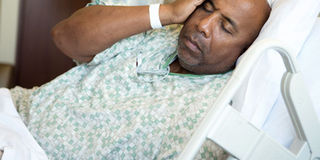Weight loss exercises suited for ill people

Lack of activity can also be of a disadvantage to bedridden patients. Courtesy photo
What you need to know:
Apart from daily cleaning the skin of this patient, ensuring they eat healthy meals; in case they can, exercise is very important as it helps to increase blood flow to the skin, prevents pressure sores from developing, among many other benefits.
Regardless of who one is or where they are, the need to stay fit and healthy is undeniable. This fact also applies to bedridden people. While Robert Katsigazi, a consultant physiotherapist with Fresco Medical services brings to light the fact that bed ridden people rarely gain weight, Quraish Golooba, a physiotherapist with Victoria Hospital, Bukoto advises on the need for minimal exercises for general body movement because we believe that the condition is temporary and the person will resume normal activity soon.
Nonetheless, the first question is why are they bedridden? Is it because of a stroke? Is it because of age? “For example, I would not advise any exercises for one with organ failure problems,” Veron Bikamata, a fitness expert, nutritional advisor, and strength & sports performance coach says candidly. He says that exercises are permissible only if it is a cardiothoracic situation where the heart muscles need strengthening.
In such a case, some light resistance work can be done on the bed using light dumbbells. If the legs can move, we exercise them to raise the heart rate hence strengthening the heart muscles.
“However, when the failed organ is around the abdomen, I would not recommend any exercise until the doctors clear the patient for some exercises,” he adds, as a matter of fact.
If someone is bedridden because they are paralyzed, they can do breathing exercises. “These are meant to improve their breathing as well as clear up the chest to avoid hypostatic pneumonia. Bed ridden people do not breathe the same way as those that are active hence at a risk of getting this pneumonia,” Golooba advises.
“Depending on their muscle strength, the health worker will decide whether to give them active or passive exercises,” Golooba points out, “When there is no strength in the muscle or the muscles can’t contract, passive exercises are ideal. Here, the physiotherapist does the exercises for the person.”
Passive exercises;
• Help to maintain or improve blood circulation in one’s body.
• Maintain muscle fiber length; in the case of contractures.
• Prevent muscle stiffening; when the muscles are not moving, there is a possibility of stiffening. These exercises help the person to be able to make use of their muscles when they get out of bed.
These include;
• Mind exercises; when one is at home, instead of letting them wallow in negative thoughts, you can give them newspapers to read if they can or put for them their favorite music.
• Hand exercises; these are to give them some form of activity and something to do other than doing nothing.
Priscillah Ondogah, a physiotherapist with Ropheka Physiotherapy says, “Bedridden people would benefit from a personal physiotherapist as part of the care team for them and their care takers.”
“Before recommending any exercise for bedridden people, they need to be assessed by a physiotherapist,” Golooba advises, “That also helps the physiotherapist or fitness trainer to work with them in order to carry out the recommended exercises.”




